Writer and founder of Peaks of Colour, Evie Muir, shares how a recent “walkshop” in the Peak District created a safe passage for loss and liberation
On the morning of our first Peaks of Colour x Right to Roam walkshop, the sun shone down on our cheeks and I was relieved. Not because I’m ever one to be perturbed by the tumultuous Northern weather, but because I wanted to create as comfortable a space as possible for those who were trusting us with their pending discomfort.
This collaborative series of walkshops — creative and holistic workshops in nature — by and for people of colour, were curated by myself and Right to Roam organiser Nadia Shaikh, with the intention of exploring alternative routes to healing and justice. As people of colour, when our communities are segregated from the land, we are also segregated from healing — these spaces hope to resist and remedy that.
Grief, that collective unifier, is often the emotion we’re forced to burden alone, yet it was grief that united us in Edale’s Village Hall that April morning. We sat round in a circle, sipping on cleaver tea freshly foraged by Nadia, mingling with faces familiar and new; but we didn’t sit down for long. After a brief introduction, we embarked on our journey and followed the road through the village, before turning down a footpath to our right.
The road ahead
Leaving the tarmac behind, we become immersed under a leafy canopy, following cobbled steps down to a sturdy wooden bridge that supports us as we cross the Grinds Brook river. More steps support us as we climb out of this wooded valley, trees parting to expose the panoramic vista that is Grindslow Knoll, a tapestry of hills and plateaus. Amid my own asthmatic pants, audible gasps can be heard from the group as we pause to take in the immensity of the landscape we’re about to venture into.
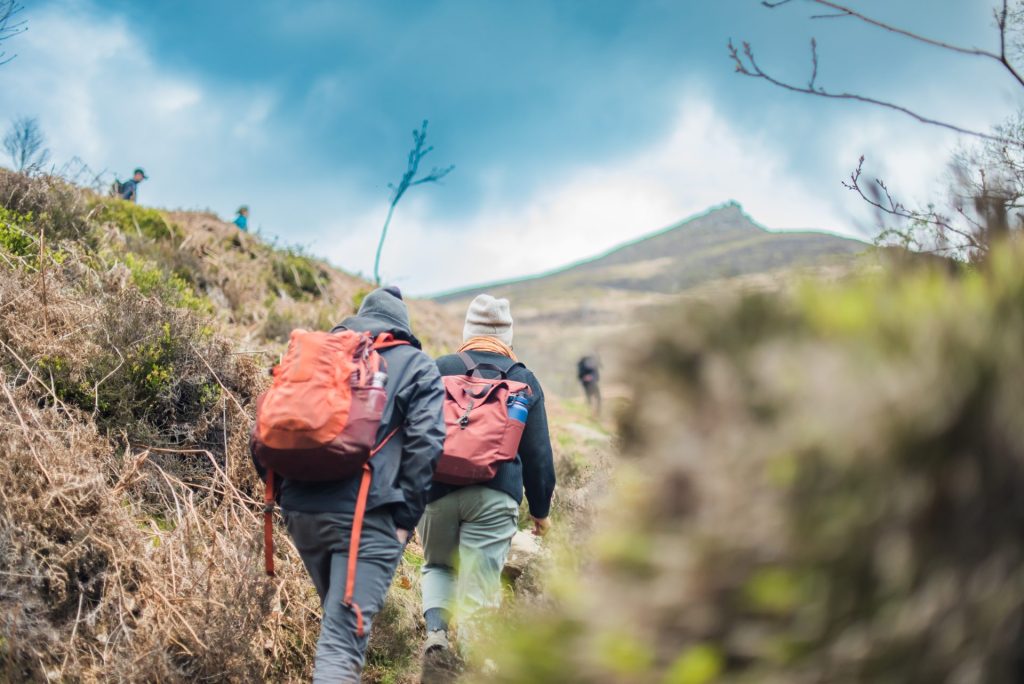
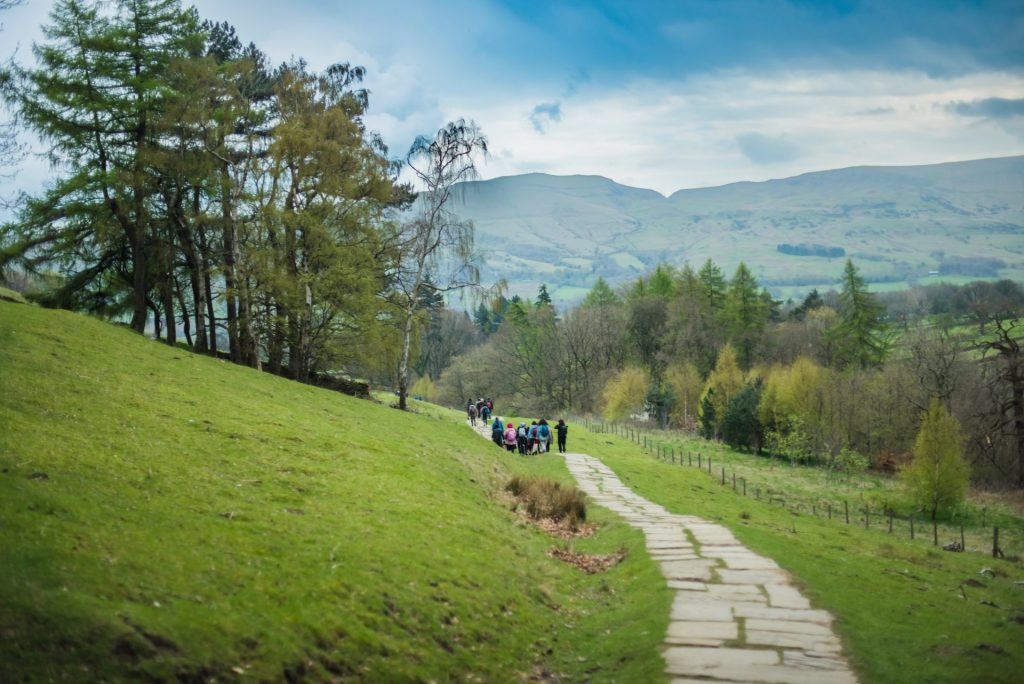
We pass through a meadow dotted with dandelions, letting the paved path guide us through another forested enclave and over another bridge, arched over a tumbling cascade of water. Here the path continues, leading other hikers on a steep scramble through Crowden Clough to the top of Kinder. Today however, we choose to ignore it.
Instead we turn down a dusty dirt path, wide enough only to put one foot in front of the other. It leads us to a grassy clearing nestled amongst the valleys of Edale, encased by the babbling brook that circles us. This is to be our workshop space. There, under the sweltering sun of an unpredictably glorious Saturday, we peel off ill-advised thermals, and come together as a community.
Taking stock
Our first workshop was led by writer and founder of Feminist Invoicing, Monika Radojevic, whose gentle guidance supported us to reckon with the uncomfortable but necessary reminder that we can’t heal from what we avoid, suppress or minimise. As the river gurgled in the background she guided us to write invoices to white supremacy and the patriarchy, for all that disconnects us from ourselves, each other and the land. One person invoiced capitalism for their inability to rest, another for memories of a lost loved one whose happiness in old photographs they’d no longer be able to experience, another for the magic lost alongside millions of species now extinct.
It was a creative and disruptive way of transforming a mundane tool of capitalism and bureaucracy, the invoice, as a template through which to quantify our traumas, process losses and better understand what we’re owed from a society that perpetually takes.
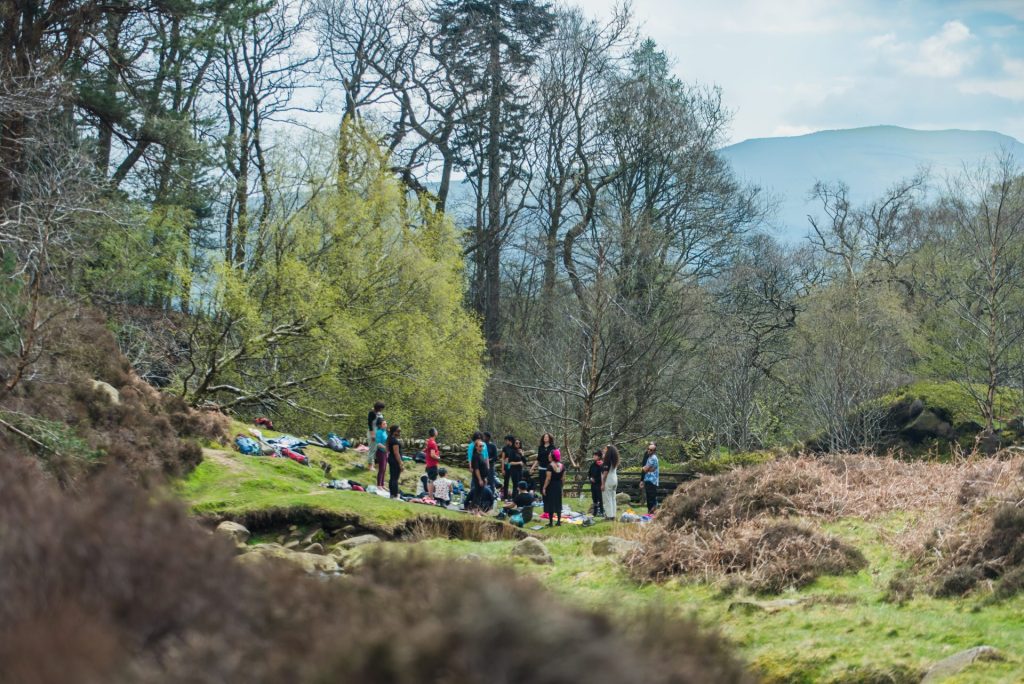
Throughout the day clouds passed overhead, inquisitive sheep inspected our goings on and stoneflies danced around us. When recceing the walk the day before, Nadia and I had intended to add another leg to the journey, envisioning that the second workshop would take place in a different field that was home to skipping lambs. By lunch however, it was clear that our current location had become somewhat of a haven. The river made a gurgling border for our grief, enclosed it for safekeeping, and then, with Farzana’s gentle guidance, we set it free.
Letting go
After lunch, Farzana Khan, founder of Healing Justice London led us in a grief circle that incorporated both discussion and embodied practices. After a grounding exercise that allowed us to feel centred in our bodies and held by the earth, we began to discuss the ways grief is both a weaponised tool of structural violence, and a powerful unifier. Farzana introduced us to the Five Gates of Grief as a lens in which to better understand our emotions, then taught us exercises that we could do as a communal or self-soothing practice, to help bring us back to a place of calm when the grief feels too much.
As the session drew to a close, she led us to the water. We formed two opposing lines on either side of the river and we let go of one of the bereavements that weighed heavy for us. I set free ‘avoidance’ as a survival strategy — it kept me safe for many, many years, but I recognise now that it no longer serves me. Together, we watched as the river carried our innermost demons away.
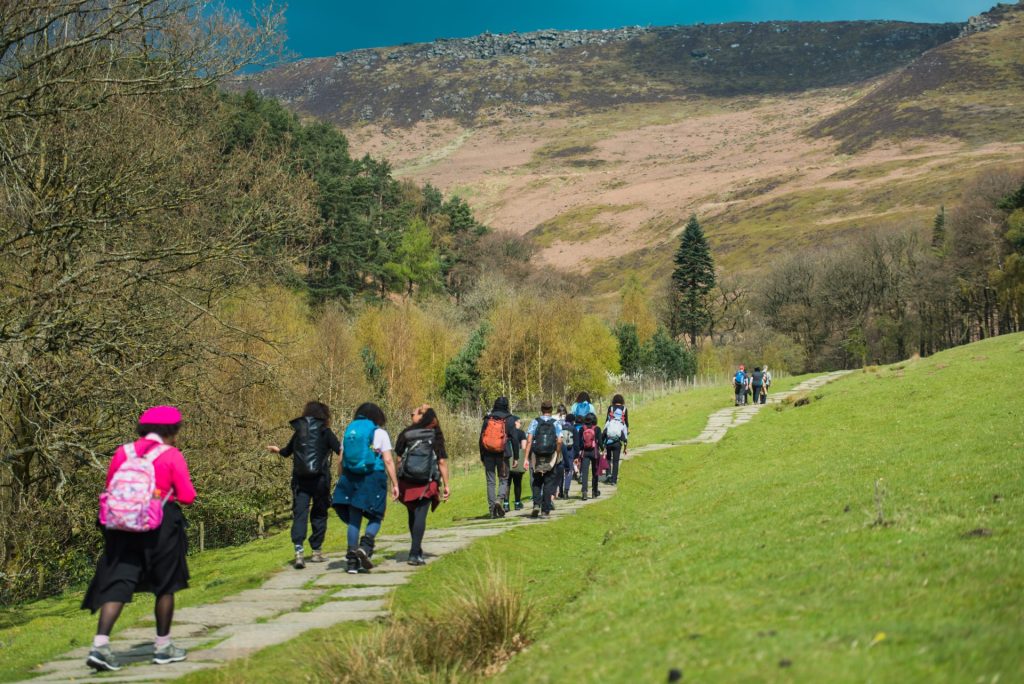
In that little corner of the Peak District we made a home for ourselves that was so all-encompassing, it was easy to forget that a world full of financial woes, work stress, childcare, deadlines, and never ending chores even existed. The last leg of the journey allowed us to gently ease back into our respective realities. We gathered our bags, distributed the last of the snacks, ensured litter was collected and with a big stretch and a shake we returned along the same route we first started.
During lunch Nadia and I had distributed small metal tins, one per person — an idea inspired by Peaks of Colour Volunteer, Dalbinder Kular’s nature writing walkshops. We guided the group to collect items from the land; a stone, a feather, a flower, a leaf — whatever caught our eyes or offered meaning to us on our walk back. In a context where our connection with land, as people of colour, is severed, these tins could serve as a reminder of time spent in nature.
I learnt that day along the hiking trails of Edale, that grief weighs lighter when held in community, and lighter still when that community is held in nature
As we followed the familiar route back I was struck with how varied the losses were that came up for people in this space. While many of us processed the more tangible losses of loved ones, one person grieved the self that was lost when they had a child, another the dualities of past, present and future selves that arise when transitioning.
For me, I grieved the person who I could have been had it not been for abusive partners stealing the opportunity to be defined by anything other than a survivor, or a victim. These personal experiences of grief were held as a communal experience. I learnt that day along the hiking trails of Edale, that grief weighs lighter when held in community, and lighter still when that community is held in nature.
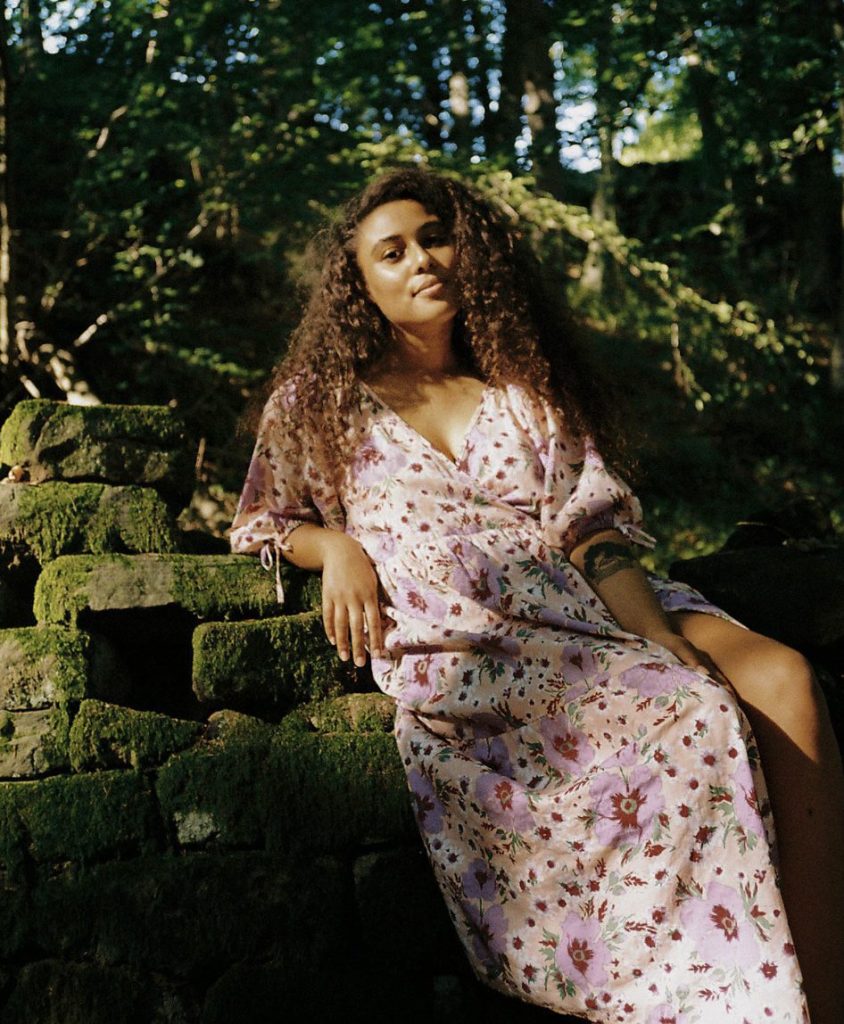
Evie Muir
I’m Evie (she/they), I’m both a domestic abuse survivor and qualified domestic abuse specialist, writer and the founder of Peaks of Colour — a Peak District based nature-for-healing community group, by and for people of colour.
Having worked in the VAWG sector for over 10 years’, specialising in Black and queer survivors’ intersectional experiences of gendered and racialised trauma, I left the sector when I became burnt out, disenfranchised and disillusioned. My work now sits on the intersections of gendered, racial and land justice, and seeks to nurture survivors’ joy, rest, hope and imagination as abolitionist praxis. Advocating for the decolonisation of the outdoors, I’m interested in the ways nature can forge a landscape of healing and justice outside of carceral feminist models.
As a Northern freelance writer I’m passionate about the liberating form of writing as healing and resistance. My debut book, ‘Radical Rest’, explores Black and Abolitionist Feminist approaches to activist burnout and will be published by Elliot & Thompson in 2024.
Sign up to walk and review Slow Ways. You can also find and follow us on Instagram, Twitter and Facebook.